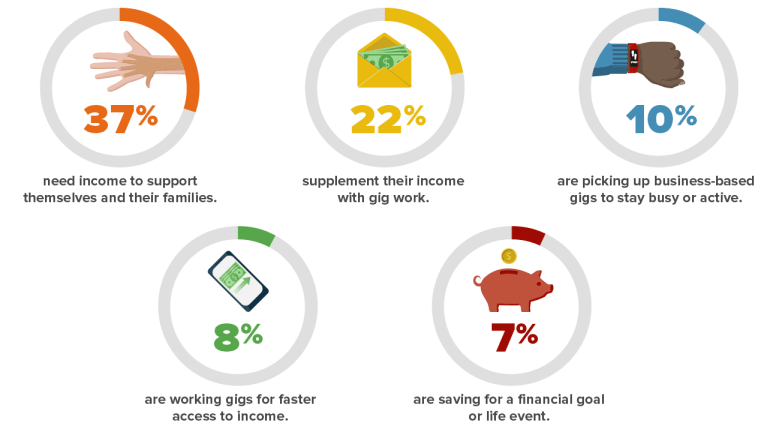The gig economy is a term used to describe the growing number of people who work freelance or contract-based jobs. These workers are often referred to as "gig workers." The gig economy has been growing rapidly in recent years and is expected to continue to grow in the future.
There are several reasons why people choose to work in the gig economy. Some prefer the flexibility and independence that gig work offers. Others are attracted to the opportunity to earn higher wages than they would in a traditional job. Additionally, the gig economy allows individuals to work on a variety of projects and learn new skills.
Challenges for Recruitment Agencies
The growth of the gig economy has presented several challenges for recruitment agencies. Traditional recruitment agencies are accustomed to working with candidates seeking full-time, permanent jobs. However, gig workers often look for short-term, project-based work, making it difficult for overseas recruitment agencies to match gig workers with the right jobs.
The Valuable Role of Recruitment Agencies
Despite these challenges, recruitment agencies can still play a valuable role in the gig economy. By understanding the needs of gig workers and employers, recruitment agencies can help connect these two groups and create mutually beneficial relationships.
Recruitment agencies can also provide gig workers with valuable support and resources. For example, they can help gig workers develop their skills, build their networks, and negotiate their rates.
The gig economy is a rapidly growing and evolving market. As it continues to grow, recruitment agencies will need to adapt their services to meet the needs of gig workers and employers. By doing so, they can play a vital role in creating a more efficient and effective gig economy.
What is the Gig Economy?
The gig economy describes the growing trend of workers who are self-employed or work for multiple employers on a contract basis. This type of work is often referred to as "gig work" or "contract work."
Gig workers typically use online platforms to find work and often work on various projects for different clients. This type of work can offer flexibility and autonomy but can also be challenging in terms of finding consistent work and earning a living wage.
The gig economy is growing rapidly, with an estimated 57 million gig workers in the United States alone. This number is expected to continue to grow in the coming years.
The Benefits of Working in the Gig Economy
There are many benefits to working in the gig economy, including:
- Flexibility
- Freedom
- Earning potential
- Opportunity to learn new skills
- Diversity of work
Gig workers have the freedom to choose their own hours, work from anywhere, and set their own rates. They also have the opportunity to learn new skills and work on various projects. The gig economy offers great flexibility and freedom, which can benefit many people.

Image Source: shrm.org
How Recruitment Agencies Can Help Gig Workers
Recruitment agencies can help gig workers in several ways, including:
- Finding Jobs: Recruitment agencies can help gig workers find jobs that match their skills and experience. They can also provide advice on writing resumes, cover letters, and interviewing for jobs.
- Negotiating Rates: Recruitment agencies can help gig workers negotiate rates with clients. They can provide information on the going rate for different types of work and help gig workers get the best possible pay for their work.
- Managing Contracts: Recruitment agencies can help gig workers manage their contracts, provide advice on contract terms, and help gig workers understand their rights and responsibilities.
- Providing Support: Recruitment agencies can provide support to gig workers, including emotional support, financial advice, and legal assistance.
By working with a recruitment agency, gig workers can access a range of services to help them succeed in the gig economy.
How to Find a Good Recruitment Agency for the Gig Economy
When trying to find a good recruitment agency for the gig economy, consider the following:
- Specialization: Ensure the agency specializes in the gig economy, meaning they deeply understand the industry and the different types of jobs available.
- Track Record: Look for an agency with a strong track record of success. They should be able to provide case studies of past clients who have found success through their services.
- Reputation: Ensure the agency has a good reputation by reading online reviews or asking for referrals from others who have used their services.
- Comfort Level: Ensure you feel comfortable working with the agency. You should be able to trust them to represent you and your interests.
Finding an agency that meets all these criteria will help you succeed in the gig economy.
The Importance of a Strong Relationship Between Gig Workers and Recruitment Agencies
The gig economy is relatively new, and the relationship between gig workers and recruitment agencies is crucial. Gig workers rely on recruitment agencies to find them work, and recruitment agencies rely on gig workers to fill their client's needs. When this relationship is strong, it benefits both parties.
Benefits of a Strong Relationship
- Gig workers can find more work opportunities.
- Recruitment agencies can fill their client's needs more quickly and efficiently.
- Both parties can build trust and rapport, leading to long-term partnerships.
Challenges to Building a Strong Relationship
- Different priorities
- Lack of trust
- Communication barriers
Despite these challenges, building a strong relationship between gig workers and recruitment agencies is possible. By working together, both parties can benefit from the gig economy.
Tips for Building a Strong Relationship
- Be clear about your expectations.
- Communicate regularly.
- Build trust.
- Be flexible.
Following these tips, you can build a strong relationship with your recruitment agency that will benefit both of you in the long run.
The Future of Recruitment in the Gig Economy
The gig economy's future is uncertain, but it's expected to grow due to demands for flexible work arrangements and technological advancements. As the gig economy continues to expand, recruitment agencies must adapt their practices to meet the unique needs of gig workers.
To remain valuable, agencies must develop a deep understanding of the gig economy and the needs of gig workers. This includes providing support and resources to help gig workers succeed, as well as developing innovative ways to attract and recruit top talent. By doing so, recruitment agencies can thrive in this rapidly evolving space and play a vital role in connecting businesses with the talent they need.
Conclusion
The gig economy is a rapidly growing and evolving sector, and Delta International Recruitment Agency, a top recruitment agency in Pakistan, plays a vital role in helping gig workers find success.
By understanding the unique needs of gig workers and providing tailored services and support, Delta International Recruitment Agency can help ensure that gig workers find the best possible opportunities and achieve their full potential. In the economy of Saudi Arabia Recruitment agencies are also playing a valuable role in helping businesses find the best possible gig workers.
By understanding the specific skills and experience businesses are looking for and matching these with the right gig workers, recruitment agencies can help ensure that businesses find the talent they need to succeed. As the gig economy continues to grow, the role of recruitment agencies like Delta International Recruitment Agency will become increasingly important.
Tips for Employers: International Recruitment Guide




